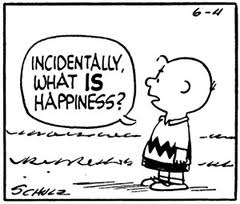Yesterday was UN International Happiness day. Some might wonder why such an organisation is spending money on promoting a day of happiness when there is conflict all over the world and victims in need of financial aid. Perhaps the very fact that they are, gives some much needed gravitas to the need for us all to be happy. If you look for a literal explanation as to the meaning of happiness you will find things like “a state of well-being characterized by emotions ranging from contentment to intense joy”. This and other similar definitions clearly define happiness as a noun or a “thing” i.e. as something you can have. A bit like a virus – only good for you!
an organisation is spending money on promoting a day of happiness when there is conflict all over the world and victims in need of financial aid. Perhaps the very fact that they are, gives some much needed gravitas to the need for us all to be happy. If you look for a literal explanation as to the meaning of happiness you will find things like “a state of well-being characterized by emotions ranging from contentment to intense joy”. This and other similar definitions clearly define happiness as a noun or a “thing” i.e. as something you can have. A bit like a virus – only good for you!
My take on it is slightly different. I think happiness is a process; it’s a way of evaluating your environment and creating an emotional state to match. That makes it more of a verb than a thing. In other words you “do” happiness rather than have it.
Like all things you do, you can learn to do it more effectively. We are creatures of habit and are pretty much programmed by a simple process of association. If you have a great experience doing something, dancing for example, then you will automatically associate pleasure with it, even the thought of it makes you feel good. If on the other hand you go dancing and you find you have 2 left feet and feel awkward and embarrassed, then that same “thing” doesn’t make you happy at all. This shows it’s not the “thing” that makes us happy, but how we react to it, based on our own individual experience.
When people come to me for treatment for anxiety or depression, its usually because they have got really good at “doing” anxiety and at processing things in a way that makes them feel bad. Not intentionally, but nevertheless very effectively. They have got so good at doing it that it becomes their default setting. Luckily with a bit of reprogramming using a range of techniques, this can be changed.
How you feel is not just about your emotional state, it also affects your physiology. The wonderful Bruce Lipton in his book “The Biology Of Belief” talks about how our emotions literally change our physiology, changing the environment of the cell to either induce health, or disease. Our thoughts are so strong that we can generate spontaneous healing given the right suggestion, this is known as the Placebo affect and most of us are familiar with this concept. But did you know that the Nocebo effect is when the opposite happens, i.e. you are given a negative suggestion of ill health, and you spontaneously generate illness, and in extreme cases such as the examples Dr Lipton gives in his book, even death. If the mind is that powerful, and it is, then we should thank the UN for raising our awareness of the importance of “doing” happy. I for one am now off to watch a comedy DVD .
If you are “doing” anxiety or depression then you may find some of the techniques I use helpful. Check out my free fact sheets here https://powertochange.me.uk/

